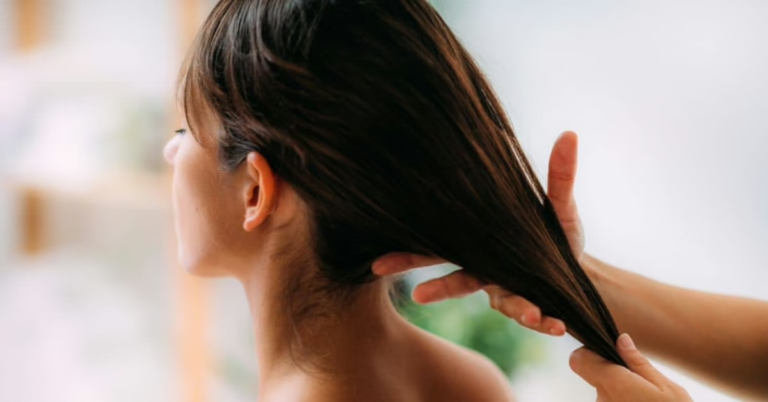5 Myths About Biotin & Hair Growth
Biotin, often celebrated as the “hair growth vitamin,” has become a cornerstone in many beauty and wellness routines. With promises of thicker, healthier hair, biotin supplements have surged in popularity. However, alongside its acclaim, numerous myths and misconceptions have emerged, leading many to form unrealistic expectations about its efficacy. In this article, we’ll debunk five common myths about biotin and its role in hair growth, providing you with a clearer, evidence-based understanding to make informed decisions for your hair care regimen.

Myth 1 – Biotin Alone Can Prevent Hair Loss
Understanding the Multifaceted Nature of Hair Loss
One of the most pervasive myths is that taking biotin supplements alone can halt or reverse hair loss. While biotin does play a role in maintaining healthy hair, it isn’t a magic bullet for all types of hair loss. Hair loss, or alopecia, is a complex issue influenced by various factors, including genetics, hormonal imbalances, nutritional deficiencies, stress, and underlying medical conditions. Relying solely on biotin overlooks these critical elements, potentially leading to ineffective treatment and persistent hair issues.
The Role of Biotin in Hair Health
Biotin, also known as Vitamin B7, is essential for the production of keratin, a protein that forms the structure of hair strands. It supports the infrastructure of hair, promoting strength and resilience. However, without addressing other aspects like overall diet, scalp health, and hormonal balance, biotin’s benefits may be limited. A comprehensive approach that includes a balanced diet, proper hair care practices, and, when necessary, medical consultation, is crucial for effective hair loss prevention and treatment.
Why Biotin Alone Isn’t Enough
Relying solely on biotin supplements can lead to overlooking other vital nutrients necessary for hair health, such as iron, zinc, and Vitamin D. Additionally, factors like stress management and avoiding harsh hair treatments play significant roles in preventing hair loss. Therefore, while biotin can be a valuable component of a hair health regimen, it should be part of a broader, holistic approach rather than the sole solution.

Myth 2 – More Biotin Means Better Results
The Dosage Dilemma: Quality Over Quantity
Another common misconception is that higher doses of biotin will lead to faster or more significant hair growth. In reality, there’s a recommended daily allowance for biotin, and exceeding this amount doesn’t necessarily translate to better results. The body can only absorb a certain amount of biotin, and excessive intake may lead to diminishing returns or even adverse effects. Understanding the appropriate dosage is crucial for maximizing benefits without risking health.
Safe Biotin Dosage and Potential Side Effects
The typical recommended daily dosage of biotin ranges from 30 to 100 micrograms for adults, though supplements often contain much higher amounts. Taking excessive biotin can interfere with laboratory test results, leading to misdiagnoses of various conditions, including thyroid disorders and heart problems. Additionally, high doses may cause digestive upset, skin rashes, or acne in some individuals. It’s crucial to adhere to recommended dosages and consult with a healthcare professional before starting any new supplement regimen to ensure safety and efficacy.
Optimal Biotin Intake for Hair Health
Studies suggest that biotin supplementation can benefit individuals with biotin deficiencies, but for those with adequate biotin levels, additional intake may not provide extra hair growth benefits. Therefore, it’s essential to assess your biotin levels through blood tests and consult with healthcare providers to determine the appropriate dosage tailored to your specific needs.

Myth 3 – Biotin Works Instantly for Hair Growth
Patience is Key: Understanding the Timeline
Many individuals expect immediate results from biotin supplements, envisioning rapid hair growth and thickness. However, hair growth is a gradual process that requires time and consistency. Biotin supports the health of hair follicles and the production of keratin, but these processes take time to manifest as visible hair growth. Typically, it may take several months of consistent biotin supplementation to notice significant improvements in hair strength and growth.
Realistic Expectations with Biotin Supplementation
Setting realistic expectations is crucial when incorporating biotin into your hair care routine. Factors such as individual metabolism, the underlying cause of hair loss, overall health, and adherence to a comprehensive hair care regimen can influence how quickly you see results. It’s important to remain patient and maintain a consistent supplementation schedule, alongside other healthy hair practices like proper nutrition, gentle hair handling, and stress management, to achieve the best possible outcomes.
The Hair Growth Cycle and Biotin’s Role
Understanding the hair growth cycle—comprising the anagen (growth), catagen (transitional), and telogen (resting) phases—can help set realistic expectations. Biotin primarily affects the anagen phase by supporting the production of keratin, thereby strengthening hair strands. However, transitioning from telogen to anagen phases and seeing visible hair growth takes time, often several months.

Myth 4 – Biotin Is Only Beneficial for Women
Biotin Benefits Across Genders
Contrary to popular belief, biotin isn’t exclusively beneficial for women. Men can also experience improved hair health and growth by incorporating biotin into their diet or supplement regimen. Hair loss and thinning can affect individuals of all genders, and biotin’s role in supporting keratin production is universally applicable. Men experiencing hair thinning or loss can benefit from biotin just as much as women.
Biotin Benefits for All Genders
Both men and women can benefit from biotin’s support in maintaining strong and healthy hair. For men, biotin can be a valuable addition to a comprehensive hair care strategy, especially for those dealing with androgenetic alopecia (male pattern baldness) or other forms of hair thinning. Additionally, biotin supports overall nail and skin health, providing benefits that extend beyond hair growth. It’s important to recognize that while biotin can aid in hair health, addressing hair loss comprehensively often requires considering other factors such as hormonal health, genetics, and lifestyle.
Gender-Specific Considerations
While biotin benefits both genders, men and women may experience different underlying causes of hair loss. For instance, hormonal imbalances such as testosterone levels in men and estrogen levels in women can play significant roles. Therefore, while biotin supplementation can support hair health, addressing gender-specific factors is essential for optimal results.

Myth 5 – Natural Food Sources of Biotin Are Sufficient for Everyone
When Diet Alone Isn’t Enough
While it’s true that biotin can be obtained from various natural food sources like eggs, nuts, seeds, and leafy vegetables, relying solely on diet may not be sufficient for everyone. Certain individuals may have increased biotin needs due to factors like pregnancy, breastfeeding, specific health conditions, or medications that affect nutrient absorption. Additionally, dietary restrictions, such as vegetarianism or veganism, or poor eating habits can lead to biotin deficiencies, necessitating supplementation.
When to Consider Biotin Supplements
Biotin supplements can be beneficial for those who struggle to meet their daily requirements through diet alone. Individuals with conditions like inflammatory bowel disease, those recovering from prolonged antibiotic use, or people with genetic disorders affecting biotin metabolism may require additional biotin. Before starting any supplement, it’s advisable to consult with a healthcare provider to assess your biotin levels and determine the appropriate dosage to address any deficiencies effectively. Supplementation should be tailored to individual needs to ensure safety and maximize benefits.
Assessing Your Biotin Intake
To determine whether you need to supplement biotin, consider factors such as your dietary habits, existing health conditions, and any medications you may be taking. Blood tests can accurately measure your biotin levels, providing a clear indication of whether supplementation is necessary. This personalized approach ensures that you address any deficiencies without the risk of over-supplementation.

Wrapping Up – Separating Fact from Fiction
Biotin undoubtedly plays a role in maintaining healthy hair, but it’s essential to approach its use with realistic expectations and a comprehensive understanding of its benefits and limitations. By debunking these common myths, you can make more informed decisions about incorporating biotin into your hair care routine. Remember that hair health is influenced by a multitude of factors, and addressing it holistically will yield the best results.
Ready to Take Control of Your Hair Health?
Explore biotin supplements responsibly and complement them with a balanced diet and proper hair care practices to achieve the luscious locks you desire. Embrace a comprehensive hair care strategy that includes nutrition, stress management, and appropriate treatments to support your journey toward healthier, stronger hair. Always consult with healthcare professionals before starting any new supplement to ensure it aligns with your individual health needs and goals.







